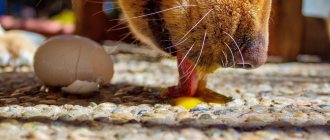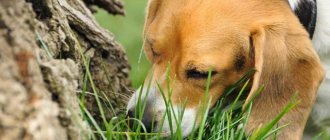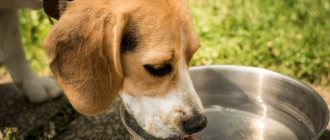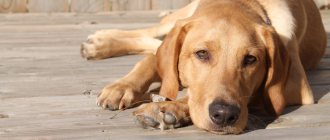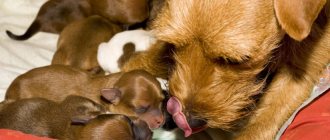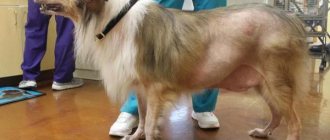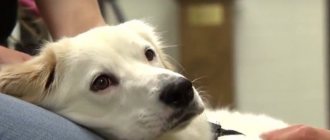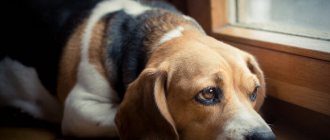Why do dogs bury food?
There are several reasons why a dog buries food in the ground. This behavior should not occur in domesticated and well-nourished animals. But they also often stock up.
Reflex
Zoological experts believe that when a dog buries food with its nose in the ground, it hides it from competitors. A similar phenomenon is often observed in animals that know what a strong and prolonged feeling of hunger is. It could appear when living with breeders next to a large number of brothers, in a house with cats, in a shelter, or on the street. Such conditions force animals to hide food for the future, so as not to starve for a long time.
Desire to preserve food for as long as possible
Dogs are guided by instincts based on the memory of their ancestors. She suggests that bones or meat hidden in the ground take longer to dry out and rot more slowly. Four-legged pets so often try to preserve the food they really like. They reduce its smell and remain calm that the supplies will not go anywhere. The food is hidden and no one will find it.
"Fight for survival"
This is their main reason. The ancestors of dogs lived in a very inhospitable world, where no one fed them every day or protected them from enemies and diseases. Therefore, modern dogs have a genetic desire to protect their food resources by hiding them (most often by burying them). Simply put, the main reason for this behavior is the program naturally laid down by nature.
This is completely normal, and it’s still not worth scolding the dog after finding another odorous “gift”.
In general, burial serves several purposes:
- Competitors will not see the “prey”.
- Being deeply buried in the ground, the seed not only does not spread tempting aromas around itself, but also lasts longer. The latter is especially important, since feral dogs and their wild relatives store supplies for a long time and seriously.
- The digestive system of dogs is designed in such a way that it absorbs “rotted” and fermented food much better.
Of course, domestic dogs do not need all these tricks, but this cannot be explained to animals. Therefore, hiding food is an integral part of a pet’s life.
How to stop a dog from burying food
If your dog buries food, you need to be patient and gradually wean the animal off the bad habit. To do this, you should develop a feeding regimen so that your pet eats up, but does not leave pieces in the bowl. Portions depend on the weight and breed of the dog and are calculated individually.
It is important to determine when a dog begins to hide food. If she buries the excess, you need to point out to the pet that this is unacceptable. It is better to take the food and put it in an inaccessible place. After a while, the dog will understand that there is no need to bury food.
If a pet hides bones and meat from its fellow cats, it is advisable to feed them in separate rooms. The process should last no more than five minutes. The bowls are then removed. This will teach your pet to eat quickly, without leaving anything behind. He will not have time to manipulate the burial, and after a while the dog will not remember him.
If your pet has recently developed the habit of burying food, you need to pay attention to its diet and daily routine. It is necessary to increase physical activity and the duration of walks. The dog should be fed after a walk, when its appetite has increased.
What is the easiest dog breed to keep?
21 simplest dog breeds
- Basset Hound. Basset for puppies on the beach | imantsu/iStock/Getty Images. ...
- Beagle. Beagle | Alaska/iStock/Getty Images. ...
- Bichon Frize Bichon Frize | Eudyptula/iStock/Getty Images. ...
- Border Terrier. Two border terriers | iStock.com/shellhawker. ...
- Bulldog. ...
- Cavalier King Charles Spaniel. ...
- Chihuahua. ...
- Collie.
THIS IS INTERESTING: How long before dogs are born do they begin to nest?
30.08.2018
Why is this a bad habit?
Burying food is an ancient instinct of dogs that allows them to survive in the wild. At home, it can be considered a bad habit. Well-fed pets forget about their supplies. Food spoils and can harm the animal's gastrointestinal tract if the dog finds it
Dogs that bury food outside can become infected or poisoned. The soil can support the vital activity of dangerous bacteria and viruses for a long time. It gets exposed to poisons and chemicals that pose a threat not only to the health, but also to the life of the dog.
The habit of burying food is observed in many domestic dogs. We must try to eradicate it to avoid unnecessary problems. Punishing a pet in this case is useless. He will become afraid and hide food more actively. It is important to determine the time of feeding and ensure that food is not left over and the dog does not go hungry.
Many four-legged friends sometimes surprise their owners with unusual behavior: they dig holes and put their food there. It is interesting to understand why a dog buries food or bones, and whether it should be punished for this.
buries a bowl of food. WHAT TO DO?
Rating of the main forums City forums City forum City forum for beginners Nizhny Novgorod politics Forum of historical justice Complaint book World Cup 2022 Women's forum Male Anonymous medical forum Stupid questions Tasty forum Lost-Found White list of Nizhny Autoforums Main auto forum Girl driving a VAZ forum 4x4 forum Complaint Chevrolet Forum Taxi Auto parts Garage forum KIA forum Renault forum Hyundai Forum VAG Forum All auto forums Shopping forums Distribution center: information forum Glav-Adjunct (from all forums, adult) Joint purchase Joint purchase: central Joint purchase: adult Joint purchase: delicious Joint purchase : mother and baby Joint purchase: cozy Joint purchase: collection of advance payment, distribution Joint purchase: services Joint purchase: region Joint purchase: Dzerzhinsk Joint purchase: Sarov Foreign online purchases Buy together Buy together: Basic Buy together: BIG SHOPPING (adult) Buy together: BABY SHOP (children's) We buy together: HOUSE We buy together: GASTRONOME We buy together: Collecting prepayments, distributions We buy together: outbuilding We buy together: services Bargain purchase Bargain purchase - general questions Bargain purchase - adults Bargain purchase - children Bargain purchase - collection prepayments, distributions Bargain purchase - announcements Purchasing forum My baby My baby - Main My baby - Announcements. General My baby - Advertisements: children's clothing My baby - Advertisements: children's shoes My baby - Advertisements: children's transport, toys, furniture Free Free Free (basic) Kittens and other animals Elite (sale of non-liquid goods) Free Student Services Housekeeping Useful forum Household problems Village forum Housekeeping Flower forum Dog owners forum Cat owners forum Dacha. Basic. Household Appliances Creative Handicrafts main Forums of interests Wedding forum I love Purple forum I hate Made in the USSR Literature and art We are against joint purchase Music Cinema forum Dance forum Treasure hunters and collectors Spearfishing Fishing Hunting Stylish forum Flirt, Love, Dating Photo forum Videography Health Human development Beer forum Culinary Perfume Perfume Shop Dog forum Dog forum: Main Dog forum: animal shelter Our Children Our children School forum Special children Charity Technoforums Internet-NN GPS forum Mobile forum Techno-forum Technotus Prof. and business forums Business forum Exchange of tasks and assignments Advertising and PR Forum of journalists and media Photography Auto business Real estate Banking forum Leaders Military forum Medicine Traders forum Accounting and audit Insurance Legal Forum of telecom operators Recruitment Work for students Software developers Design forum Construction forums Construction forum (main) Windows Forum for electricians Furniture Air conditioning and ventilation Forum on thermal insulation Forum for construction announcements Forum for designers Forum for architecture and design All construction forums Tourism, recreation, extreme sports Tourism, recreation, extreme sports Sports forums Fans club Sports ground Martial arts Cycling forums of Nizhny Novgorod Cycling forum of Nizhny Novgorod Travel Nizhny Novgorod region Real estate Real estate Mortgage Joint rental housing Land forum HOA Gardening partnership Residential areas Avtozavodsky district Moskovsky district Sormovsky district Meshcherskoe lake All district forums House forums Ships Novaya Kuznechikha Oktava residential complex (st. Gleb Uspensky) Monchegoria Residential Complex Aquamarine Residential Complex (Komsomolskaya Sq.) Sormovskaya Side Residential Complex KM Ankudinovsky Park Residential Complex Krasnaya Polyana Residential Complex (Kazanskoe Highway) Seasons Residential Complex (Kstovsky District) Strizhi Residential Complex (Bogorodsky District) On Pobednaya Residential Complex (Pobednaya St. , near house 18) Oksky Bereg residential complex (Novinki village) Flowers residential complex (Akademika Sakharov St.) Village Krutaya kp (Kstovsky district) Opalikha kp (Kstovsky district) South microdistrict. (Southern Boulevard) Gagarin Heights microdistrict. Burnakovsky microdistrict. White City microdistrict. (60-let Oktyabrya str.) Zenit residential complex (Gagarin Ave.) Seventh Heaven residential complex All house forums Private forums Sarov Buyers Club Shopping on the iHerb website June mommies Dating and Pleasant Communication Forum of crazy ideas Night forum Kingdom of crooked mirrors Looking for a soul mate! Buttercup flowers BUYING-SELLING Slim squad Beekeeping Forum of the lazy Volleyball club of tourists Meetings for sex I'll be a mother! Alcohol forum Buttercup flowers Cat breeding Forum of sexual experience Svobodka Holiday forums Holiday forum Moderators forum New moderators forum Feedback and suggestions (technical support)
Our faithful four-legged friends sometimes surprise their owners with their unusual behavior. Digging holes, hiding food, bones, toys, eating inedible objects. How to react to strange tricks of a pet, what to do in such a situation?
Innate reflexes
The most common reason is the dog’s natural reflex is triggered when the animal is simply stocking up for a “rainy day.” This phenomenon can occur in dogs that were taken into the home as adults, or they have previously often experienced a feeling of hunger. This manifests itself very well at first in dogs that previously lived with a breeder along with a large number of other dogs, or in houses where a cat and a dog live together. In such conditions, animals begin to compete and hide food from each other so as not to remain hungry. If you take a small puppy into your home, then his habit of burying food will quickly go away over time, as soon as he understands that no one in the house will take away his food.
A similar reflex occurs because dogs are descendants of wolves, and they have the habit of attacking animals even larger than themselves during hunting. Naturally, it is not possible to eat all the prey at once, so wolves usually tear up the remains and bury them, leaving them as a reserve for the future. Our four-legged friends do the same. There is another reason - it is possible that your dog is afraid of animals and hides all the food so that other cats or dogs do not approach it in an attempt to take the food.
Why does this behavior still occur?
Another reason why dogs often bury food or bones is your pet's sincere desire to keep the tasty morsel unspoilt for as long as possible. Hidden in the ground, food is less likely to rot and will take longer to dry out. Therefore, it is possible that your four-legged friend simply loves what he eats and strives to prolong his pleasure.
And finally, another reason is the smell of food. By burying it in the ground, you can reduce the smell of food. And this allows you not only to make your supply less noticeable to other animals, but also helps the dog not to be distracted once again by the food already stored in order to calmly search for food for the future.
There is no point in scolding a dog for such behavior, because it is difficult to go against the nature of reflexes. It is better to pay special attention to the proper nutrition of the dog - if she has never experienced acute and prolonged hunger in her life, then it is quite possible that it simply will not occur to her to hide food in the ground.
Other versions
There are many versions that can explain dogs hoarding food in reserve:
- Adult dogs adopted from a shelter hide and bury food because they often experienced hunger until they found loving and attentive owners. The dog still has a strong reflex, so it will take a lot of time and patience to wean your pet from this habit.
- The smell of food. According to this theory, food buried in the ground loses its aroma and smell. In this way, the dog makes its “hiding place” less noticeable and attractive to other animals.
- Presence of other dogs or animals in the house. In this case, hiding food, the dog is worried that its competitors will get its tasty morsel. For example, a cat comes up to a puppy’s bowl and brazenly takes or steals the food. The dog’s self-preservation instinct is triggered and the resourceful dog makes supplies for itself.
- Psychological problems caused by errors in care and feeding. If the dog is malnourished, often feels hungry, rarely gets his favorite treats, or vice versa, the owner overfeeds the dog, you should not be surprised that the dog will hide food.
- Nervous disorders. Unfortunately, dogs hide food, food, and other objects due to neurological pathologies. This behavior is caused by head injuries, phobias, fears, and panic attacks.
Important! The instinct to hide food is caused by the dog’s desire to “protect”, “hide” its treat from prying eyes. As a rule, if a dog has received a large bone, a huge piece of meat, he is not able to eat it right away, and while the treat is in his mouth, other animals can snatch it.
Another reason why dogs bury food, bones, and other favorite treats is the animal’s sincere desire to keep the tasty morsel unspoiled for as long as possible. Food buried in the ground is less susceptible to rotting and will not dry out quickly. Perhaps your dog buries and hides the food that he likes the most.
There is another theory. Dogs hide food they don't like very much. The dog is simply making a hiding place for a rainy day or, which is possible, he believes that a bone or other food lying in the ground will be tastier.
"Guilty Face"
You come home and discover that the dog has done some mischief and is now sitting there looking guilty.
Many owners think that the dog knows it is to blame.
Actually this is not true. Research has proven that unless you catch your dog in the act of doing something wrong, he has no idea he did anything wrong or why you're angry.
That is why punishing a dog a few hours later is completely pointless: punishment is in no way connected in its mind with past hooliganism.
So where does this facial expression come from? The dog simply reacts to your behavior: angry face, screaming, punishment, etc.
Age-old instincts
Our pets' ancestors had to survive in harsh conditions. There was not always enough food, and after a successful hunt there were often “pieces” of carcasses left. It was at this stage of development that dogs learned to bury excess food in order to have a “safety cushion” in case of an unsuccessful hunt.
Modern dogs have retained this instinct and even use it. For example, if a dog buries bread, a crust forms on it, but the product inside is preserved and will be usable even after several months. This instinct is not associated with the seasons of the year, as in animals that hibernate, so caches of food can be found in the house and yard year-round.
It would seem, why hide food, because the dog receives food every day? This question will become even more relevant if we take into account the fact that not all dogs have a tendency to hide food.
Chasing the tail
Some people find this behavior cute and funny, while others find it annoying, especially if the dog won't stop spinning.
Whether you like it or not, compulsive tail chasing is a sign that something is wrong with your dog.
Typically, dogs exhibiting this behavior were weaned too early (before 8 weeks of age) or are deficient in certain nutrients and trace elements (usually vitamin B6 and vitamin C).
Beware of encouraging behavior
In the last paragraph of the reasons why a dog hides food, we touched on the issue of lack of attention. The habit of making hiding places may seem fun and harmless, but it should not be encouraged, even unconsciously. If at any point, the dog decides that you are enjoying the hidden food, you will begin to discover more and more supplies.
How will it all end? The dog will hide a perishable product, for example a piece of fish, an unpleasant smell will appear in the house, you will find its source and punish the pet. At this moment, the dog will have a resonance: why are you fighting for something that you used to like?
Yes, the instinct to hide food is absolutely normal, but it does not provide any benefit. You can’t be sure that your pet won’t decide to profit from its reserves, can you? What will be the consequences of eating food that has been stored in a warm shelter for several weeks or months? At a minimum, to poisoning or bacterial damage.
Mark for others
It’s worth clarifying right away that not every dog is prone to this behavior. Having dealt with their affairs, only 10% of animals scratch the ground in this place. It doesn't depend on gender. The reason for such actions lies in the fact that the animal wants to mark the territory, and the earth dug up around will help to retain the smell of excrement longer.
This behavior can also be observed in other mammals, such as wolves, lions and coyotes. The leader of a pack of wolves thus demarcates his territory from representatives of another pack. Such a mark serves as a danger signal for those who dare to cross this area.
Coprophagia
This is probably the most unpleasant dog behavior for us. Eating poop is not only very gross, but it is also a known way to spread diseases.
(Not to mention, what owner wants to be licked by a dog that just ate poop?)
Why dogs do this is not known exactly, although we do know that mother dogs eat their puppies' poop to keep the family nest clean.
We also know that starving dogs eat poop to survive.
Danger from eating soil
One cannot underestimate the danger that threatens a four-legged pet with such a radical change in food preferences. If left unattended, the habit of eating soil will become commonplace.
How does this threaten the dog’s health?
- Damage to the esophagus by parasites. Even a small portion of land will be enough.
- Serious poisoning of a dog, leading to digestive failure. Against this background, diarrhea or constipation develops. This is due to the accumulation of various poisons and toxins in the urban soil, which penetrate into it with precipitation and along with exhaust gases.
- Intestinal blockage - obstruction. Also, eaten pebbles can damage the mucous membrane of the intestines or esophagus, and in the mouth, damage the integrity of the teeth. The worst outcome is death from suffocation if rocky particles become lodged in the throat.
To avoid harmful consequences, it is necessary to wean the animal from its atypical addiction as soon as possible.
Reverse sneezing
If you've ever heard a dog do this, it probably scared you. It sounds like the dog is going into anaphylactic shock or something.
This is the common name for pharyngeal reflux, caused by irritation in the dog's throat and soft palate. Like regular sneezing, reverse sneezing occurs due to allergies, mites, squeezing by a leash, etc.
Reverse sneezing is a way for a dog to bring air back into the body to get rid of irritants. Some also believe that dogs may do this because they are overstimulated.
Causes
Possible reasons that could explain the dog's desire to eat earth and sand:
- The body's need for some vital elements: minerals, vitamins. Then there is an instinctive desire to fill the gap.
- Infection with helminths. As a result of discomfort in the intestines, the animal seeks to get rid of it in any way.
- Lack of attention from the owner. In this way, the pet tries to attract attention to itself.
- Depression. Often loneliness or a stressful state leads to psychological disorders and the manifestation of nonspecific habits. One of these is pica - the habit of eating something that is not food, just to fill the stomach.
- Uncontrolled behavior. During play, a puppy or an adult dog may lose control of himself so much that he thoughtlessly swallows a handful of earth or stones.
- Basic curiosity. Sometimes a puppy just wants to taste something unusual and new that is still unfamiliar to him. This is how he experiences real life.
Wallowing in disgusting things
You wash your dog and he goes for a walk, finds a dead squirrel and lays on it. Why?
We can't say for sure. Most theories agree that dogs inherited this behavior from their wild ancestors.
This could have been a way of masking its own scent when tracking prey. Or they did it to let other members of the pack know that they had found something good, perhaps food.
It may also be that the dog is trying to mark the find with its scent in order to declare that it is its prey, whatever it is.
Others think dogs simply do it because they like the smell—after all, their noses are 10,000 times more sensitive than ours, so all that stink might just make them happy.
Based on materials from iheartdogs.com
Dog owners often complain about the problem - their pets dig a hole, put bones and pieces of meat in it, and then bury it. Why do they do this, and whether four-legged friends need to be punished in this case – we’ll look at this in the article.
Presence of rivals, pack behavior
But still, dogs, being the only pets of their species in the house, do not hide food so often. It’s a different matter when there are two or more dogs at home. In this case, deposits of seeds and other “goodies” cannot be avoided for several reasons:
- The dog is afraid of competition
and tries to hide the most tasty morsels as securely as possible.
- Natural predisposition.
The dog tends to save food in case he has to fight for dominance in the pack (i.e., he creates an energy reserve), or hides food in case he is suddenly expelled from the pack. - Echoes of the pack past of dog ancestors.
They always hid excess food, not only for the sake of creating food reserves for a rainy day, but also in order not to attract flocks of large and dangerous predators to the territory.
However, a lot here depends on both the dog and its breed. Thus, in large and especially large breeds this behavior is not very pronounced, but huskies and shepherd dogs “sin” almost all of them by hiding food.
In addition, the degree of friendliness of the animal plays a big role. It happens that a dog is not averse to sharing a bone with his “partner”, and therefore he does not try to hide it.
3 reasons why your dog is hiding food
In addition, many pets, in the presence of a real competitor in the person of another dog, do not suffer from the “hamster instinct”. If they are prevented from burying food in complete privacy, they eat it.
Do we need to fight this?
Maybe you don't like digging up dirt in your own yard. However, experts do not recommend prohibiting such quirks from your dog. If this makes her calmer and more confident, then with your prohibitions you will only make your pet nervous and worried.
If your dog does this to your flower bed, make a fence for it, move or leash the dog. But it’s definitely not worth scolding her for completely normal instincts dictated by nature itself.
Found a violation? Report content
Burying food
If our dog has an open space, we shouldn't be surprised when you catch him burying food. Even if you're in a yard with soil that can't be dug up, he'll at least try.
To do this, it scratches with its legs and pushes its nose around, which covers the food with dirt. To understand the meaning of this instinctive gesture, we must go back to its origin, that is, to wolves.
Why do dogs eat dirt, stones and sand while walking?
Let's look at the possible reasons in more detail...
Bad food
Eating clay and soil may be your dog's search for minerals, vitamins, or live probiotics that are lacking in your dog's diet. The cause may be a dry and unbalanced diet.
Geophagy is a condition in which representatives of the animal world eat everything except food. For example, eating dirt may be a sign of geophagy.
This usually happens in cases where the dog’s body does not receive enough minerals or suffers from nutritional deficiency or imbalance. We should not forget that dogs' natural instincts help them survive. If indiscriminate eating of garbage and soil continues for several days, then you should think about changing your diet. The best option is to work with your veterinarian to find a nutritional solution.
Carol Osborne, veterinarian
Sometimes pets eat food from the street because homemade food does not suit them. As a rule, this happens when the animal does not receive raw meat and bone food. Most of these problems occur due to cooked food rather than raw food. Canines seek out vitamins and minerals that they do not receive due to the lack of raw meat in their diet. Changing your diet quickly solves this problem. One solution is to choose raw feeding rather than cooked food. From raw food, the dog receives minerals and components that are lacking in cooked food.
Laura Koger, veterinarian
Do you think your furry friend is getting all the necessary components from his diet?
Chronic diseases
Eating waste in search of missing vitamins and minerals may be a consequence of inflammatory bowel disease or hypothyroidism.
According to veterinarian, nutritionist and nutritionist Judy Morgan, inflammation in the intestines can lead to bleeding along the inner walls or the formation of ulcers, which leads to anemia. In IBD (inflammatory bowel disease), the absorption of B vitamins is reduced.
Dogs with IBD may eat soil as they try to obtain components from it that help treat their anemia. Thyroid hormone helps stimulate the bone marrow to produce red blood cells. When thyroid hormone production decreases in hypothyroidism, bone marrow stimulation and anemia decrease. Bleeding tumors, parasites, ulcers, and chronic kidney disease can lead to anemia. Some tumors will also bleed (particularly hemangiosarcomas), leading to anemia.
Anemia is caused by internal parasites such as hookworms. They take root on the inner wall of the intestine and suck blood. Other parasites reduce the level of nutrient absorption. External ones, such as fleas and ticks, suck blood, causing anemia, according to Dr. Morgan. – A stomach ulcer can cause anemia. Chronic kidney disease can lead to anemia because the kidneys are involved in the production of erythroprotein, which is a hormone that stimulates the bone marrow to create red blood cells. Autoimmune diseases lead to decreased production of red blood cells or platelets, which in turn leads to anemia.
According to: Kidney disease: why natural treatments are best
Such tasty dirt
A less serious reason is your dog's desire to taste something tasty, be it the enticing smell of bacon bits or leftover hamburger. Perhaps the site still retains the smell or ingredients from a recent picnic.
If the dog likes to eat from the ground, then the owner should first check the walking area for the presence of “snacks”. Especially if your animal often returns to a certain place.
Problems of education
People tend to acquire peculiar habits in the fight against stress or boredom - curling their hair, cracking their joints, overeating and others. It's the same with animals. Dogs are very active creatures, very energetic, but they cannot always satisfy their needs.
Chicken products and by-products in a dog's diet
Chicken as a component of a dog’s diet is a very controversial product. It can be included in your pet’s diet only if representatives of its breed are not prone to allergies or the dog does not have an individual intolerance to chicken meat.
If you still decide to give chicken, then the only option is boiled. Raw chicken meat may contain salmonella and, as a result, lead to salmonella infection. But there is also a negative point - the nutritional value of meat after heat treatment is significantly reduced.
In terms of benefits and harms, by-products do not differ from chicken meat itself. The exceptions are chicken stomachs and hearts, as well as liver. Chicken stomachs and hearts are rich in protein and other beneficial vitamins. They are especially useful for your pet's coat, giving it a healthy and shiny appearance. Boiled liver is no less useful, but moderation must be observed to avoid hypervitaminosis.
Important! Chicken bones should absolutely not be given to a dog in any form!
Why shouldn't dogs be given chicken bones?
Chicken bones should never be given to dogs. This is due to their tubular structure. When chewed, they form sharp chips that can damage the dog's intestines and mouth. This is especially dangerous for puppies, small breed dogs and older dogs.
Remember! Only raw bones are digested in the stomach. Boiled bones are not digested and cause constipation or simply accumulate in the intestines.
What harm can chicken bones cause?
- Damage to tooth enamel.
- Broken tooth.
- Damage to soft tissue if a bone fragment gets stuck between teeth. The result is tooth loss.
- Meningitis: if a splinter got stuck between the teeth, damaged soft tissues, suppuration began, which was not cured in a timely manner.
- Constipation.
- Peritonitis caused by intestinal damage.
- Perforation of the stomach or intestines.
- Diseases of the stomach and intestines caused by accumulated bone debris.
Negative experience
This behavior is not uncommon in dogs that were adopted as adults or from the street. They had faced hunger more than once, and the fear of being left without food was deeply rooted in their minds. Animals that previously lived with a breeder can also find it difficult to get rid of the habit of stocking up for a rainy day. Forced to compete for food with their brothers, they learned to hide food so that their stronger brothers did not get it. The situation is simpler with a puppy. He will gradually get rid of the habit of making stashes as soon as he feels that there is enough food and no one will take it away. If, despite good nutrition, behavior does not change, this is a reason to think about other reasons.
Lack of attention
Humans are to blame for many negative aspects of pet behavior. Dogs, like children, tend to attract attention by acting strangely. What if your pet didn’t behave this way as a puppy, and then suddenly developed the habit of hiding food? This means something is wrong. Probably, the owner had a lot to do and began to devote less time to his pet. He feels abandoned, and fights loneliness with his own methods - playing pranks and doing whatever he wants. This is how he shows offence, and tries to attract attention to himself. The animal does not care how a person reacts in such a situation. Laughter, swearing or surprise - he will be satisfied with any option except silence and ignoring. All a pet needs is to know that they remember him, notice him, and hear the owner’s voice.
As you can see, the reasons why a dog hides food are different. Don't rush to punish her for this. Try to understand your pet and do everything possible to make her feel comfortable. Gradually the unwanted behavior will disappear. Patience and observation will help build trusting relationships and forever get rid of problems with digging holes with food stashes.
- Author: Elena Romanenko
Rate this article:
- 5
- 4
- 3
- 2
- 1
(7 votes, average: 3.6 out of 5)
Share with your friends!
Why is this a bad habit?
Burying food is an ancient instinct of dogs that allows them to survive in the wild. At home, it can be considered a bad habit. Well-fed pets forget about their supplies. Food spoils and can harm the animal's gastrointestinal tract if the dog finds it
Dogs that bury food outside can become infected or poisoned. The soil can support the vital activity of dangerous bacteria and viruses for a long time. It gets exposed to poisons and chemicals that pose a threat not only to the health, but also to the life of the dog.
The habit of burying food is observed in many domestic dogs. We must try to eradicate it to avoid unnecessary problems. Punishing a pet in this case is useless. He will become afraid and hide food more actively. It is important to determine the time of feeding and ensure that food is not left over and the dog does not go hungry.
Should you scold your pet and why is hidden food dangerous?
There is no point in scolding, punishing, or even beating a dog if it hides food. At the same time, you need to understand that food in the ground is in any case subject to rotting processes. A dog may not visit its hiding place for months, and during this time the food will spoil and the “treat” eaten will cause intestinal upset and acute poisoning.
If the dog makes hiding places at home, over time the food will begin to spoil. An unpleasant odor will appear, the source of which cannot always be immediately found, and this is not to mention the fact that the dog may become poisoned by eating a spoiled treat, contaminated with bacteria or mold-like fungi. Therefore, be patient and try to gently eradicate the habit in order to avoid possible serious problems.
What to do
If a dog is repeatedly caught eating soil while walking or at home, from flower pots, there is no need to panic.
The first thing you need to do is find out the reason, and then act step by step.
It is unacceptable to yell at your pet or resort to physical punishment.
Measures that are recommended to be taken:
- Review your diet, including more fresh vegetables and fruits.
- Deworming is carried out. The procedure is repeated every 3 months, regardless of the content. Moreover, preventive cleaning is necessary for all pets (if any) and family members.
- Give the dog multivitamin complexes. Select on your own or on the advice of a veterinarian.
- They plant grass on the windowsill at home so that the pet will switch to it and forget about the ground.
If, despite physiological reasons being excluded, the animal continues to eat soil, then the cause is psychological disorders. Then they go to the veterinary clinic, where they inform the doctor about the strange behavior of the dog. Depending on the results of the examination, he will select appropriate sedatives and prescribe a course of treatment.
No less effective, in terms of restoring emotional imbalance, is a caring and courteous attitude towards your pet. They try to spend more time with him, go for walks and communicate more often.
When walking, it is advisable to keep the dog on a leash so that you can pull it back at any time and prevent another attempt to eat the ground. It is recommended to consult a dog trainer on this issue.
Increased smell
This method works for two reasons:
- Other animals smell excretions mixed with damp soil.
- They see scratches left as a warning.
Tire temperature indicator: updates announced for Porsche 911
The girl blogger amazed the Internet with her outfits that date back to different eras
The husband made his wife's dream come true by disguising the door to the bedroom
In addition, glands on dogs’ paws secrete a liquid that gives the earth an odor during “excavations” carried out by the dog. These glands include sweat glands (on the pads of the paws) and sebaceous glands (between the toes).
Lack of walking and exercise
A dog is an active animal that needs regular exercise to maintain healthy tone. City apartments are too cramped a space for large and hunting breeds, especially with irregular walking. Ideally, you should take your pet outside twice a day, but due to the busy schedules of modern city dwellers, this is not always possible. Locked within four walls, he suffers from idleness and lack of opportunity to frolic. And he starts digging holes. If there is currently unnecessary food nearby, this behavior makes sense. He finds something to do that uses up his unspent energy, and makes provisions along the way.
Why does a puppy constantly ask for food: features of a growing organism
If your four-legged beggar is a puppy, then most likely you are simply not feeding him enough. A growing body requires much more strength and energy than an adult. Almost everything eaten is burned during the active work of internal organs and systems.
Up to 2 months, puppies are fed up to 8 times a day, including breaks for night feedings. The number of meals is reduced incrementally along with an increase in the daily portion so that by the age of 1 year the four-legged dog eats no more than 2 times a day.
